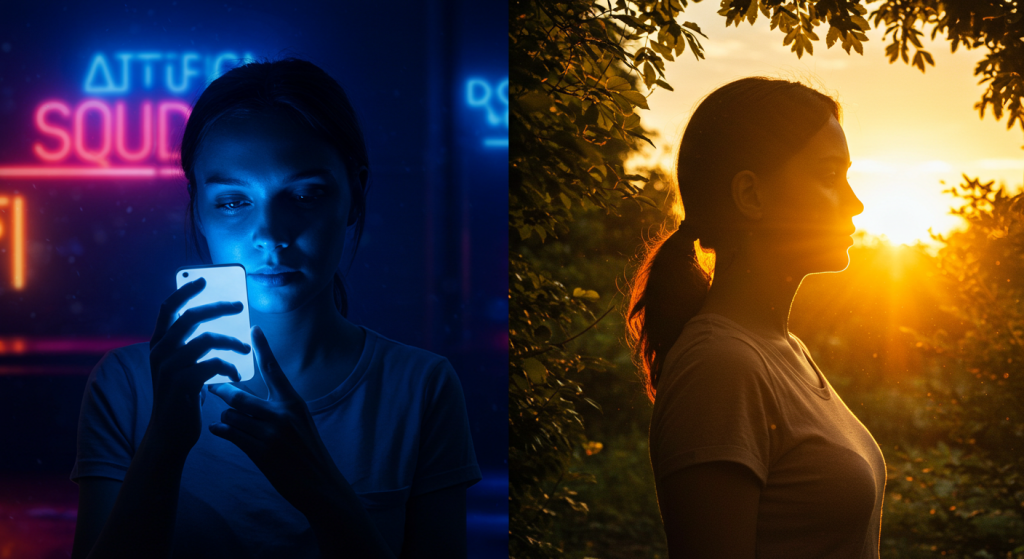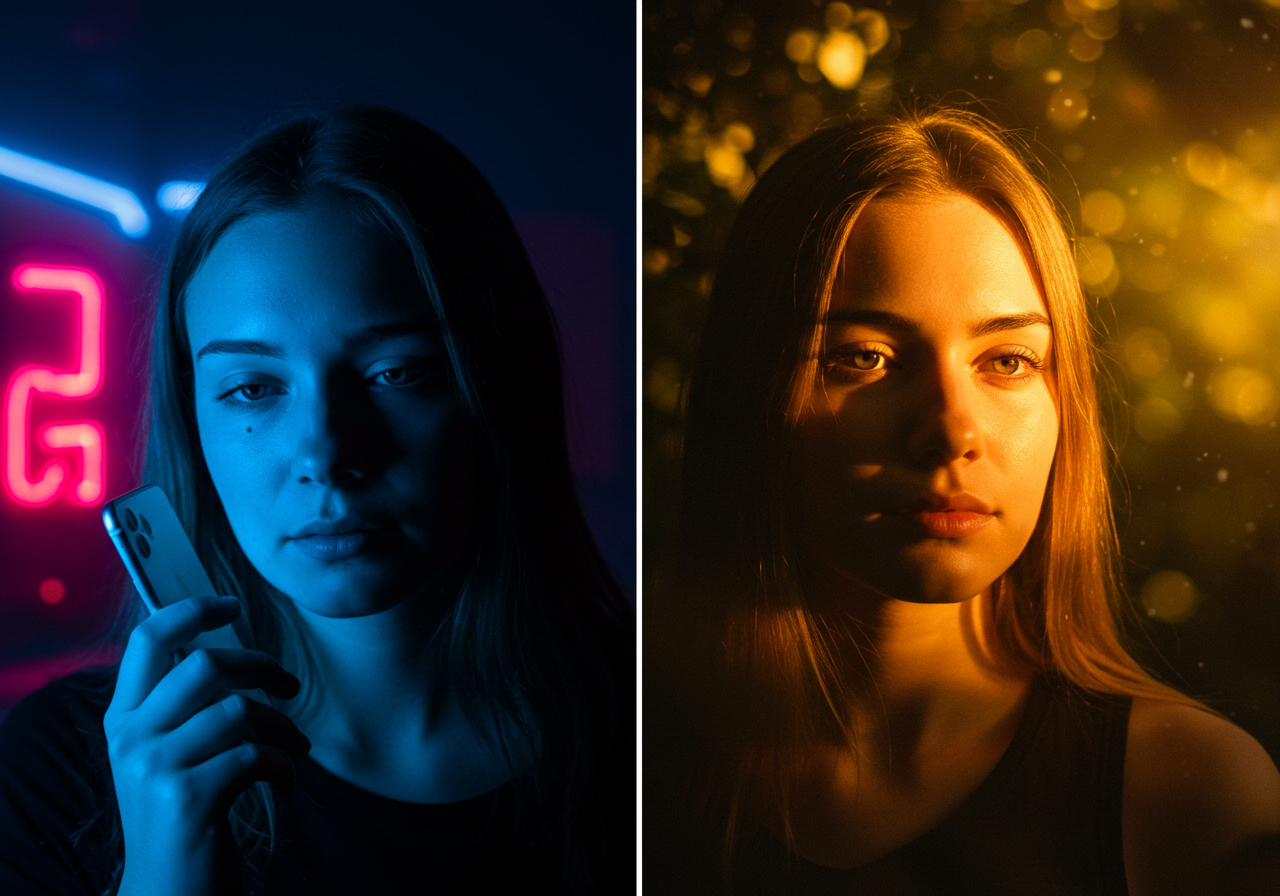
In addition to its effects on sleep, excessive exposure to artificial light can also harm our eyes. It’s similar to looking directly at the sun—eventually, that glaring light takes its toll. Symptoms such as eye strain, headaches, and blurred vision have all been linked to too much screen time in poorly lit environments. Moreover, artificial light can have a surprising connection to weight gain. Lack of sleep can trigger cravings and poor food choices, like opting for an extra slice of pizza instead of a healthy salad.
Furthermore, our mental health isn’t spared from the consequences of too much artificial light. The overabundance of light, especially at night, can trigger anxiety and elevate stress levels. It’s as though our brains are constantly on high alert, struggling to find peace in a sea of illumination. So, next time you’re winding down for the day, consider giving your eyes a break from that glow. Your body—and mind—might just thank you for it.
The Hidden Dangers of Artificial Light: Effects on Health and Well-Being

How Artificial Light Disrupts Your Mood and Energy
The impact of artificial light goes beyond just your sleep. It can also affect your mood and overall energy levels. Have you ever noticed how a cloudy day can leave you feeling a bit down? This response is your body’s natural reaction to changes in light. Prolonged exposure to harsh artificial lighting, such as fluorescent bulbs commonly found in offices, can lead to fatigue and irritability. It’s like trying to read under a flickering bulb—frustrating and mentally exhausting.
From Sunlight to Screen Light: The Hidden Health Risks of Our 24/7 Electric Lives
Ever noticed how you scroll through your phone or binge-watch your favorite series late into the night? Well, that blue light from screens is a silent saboteur, messing with our sleep cycle. Just like a vampire inviting you in, it lures you away from those cozy, restful hours. As we shed sunlight for screen light, our bodies become confused, thinking it’s still day, which messes with melatonin production. Ever felt that sluggish, foggy feeling the next day? It’s your body yelling, “Hey, where’s my sunlight?”
Let’s not forget about the strain technology puts on our eyes. Imagine staring at a bright light for hours while you’re trying to read—sounds uncomfortable, right? That’s what digital eye strain feels like, leading to headaches and blurred vision. Our eyes tug at us for more breaks, but we ignore them and dive deeper into the digital abyss.
Then there’s the subtle yet significant impact on our mental health. Constant notifications, social media comparisons, and the never-ending news cycle can create a pressure cooker effect. It’s like being in a crowded room where everyone’s talking, but you can’t hear a single word clearly. This endless cycle of engagement can leave us feeling anxious and drained.
So, while our screens connect us like never before, they also carry hidden health risks that can affect our well-being. It’s time we find the right balance to reclaim our health and happiness amidst this electric lifestyle.

Bright Lights, Dimmed Lives: The Surprising Effects of Artificial Illumination on Sleep Quality
Imagine your body as a finely tuned orchestra. Just like instruments, our biological clocks need time to warm up before the big performance—sleep! But those bright screens and buzzing light bulbs? They’re the rowdy crowd that disrupts the symphony. Exposure to artificial light, especially in the evening, sends our brains a misleading signal: “Hey, it’s still daytime; keep partying!” This confusion can result in a dramatic shift in our sleep cycle, leading to restless nights and groggy mornings.
But it’s not just about catching Z’s. Poor sleep quality can mess with your mood and productivity. Feeling irritable? Blame the bright lights that tricked your brain into thinking it should be wide awake. It’s like trying to run a marathon with a boulder strapped to your back—you just can’t perform at your best!
And here’s a surprise twist: even the flickering fluorescent lights in your office can mess with your precious REM sleep. Who knew that your work environment could play the role of an uninvited guest in your dreamland? So, what can we do? Take a moment to dim those lights, embrace the soft glow of a candle, and let your body catch a break. Your mind and mood will thank you for it! Adjust your lighting, and you might just find that peaceful slumber isn’t as elusive as it seems.
How Artificial Light is Redefining Our Biological Clocks: A Closer Look at Circadian Disruption

You might think, “But isn’t artificial light just a tool that helps us get more done?” Sure, it’s convenient, but at what cost? Exposure to artificial light, especially from screens, hinders melatonin production, that crucial hormone for regulating sleep. Imagine trying to enjoy a tranquil evening in a cozy cabin, but a neon sign blares outside your window all night long. It’s distracting and frustrating, right?
Moreover, this disruption can lead to various health issues, from insomnia and fatigue to long-term problems like obesity and depression. So, what can you do? Consider dimming the lights in the evening or investing in blue-light-blocking glasses. Your body will thank you for it, allowing your internal clock to swing back in sync. Remember, finding balance in this light-filled world is key to reclaiming that sweet harmony in your life.
The Blue Light Dilemma: Understanding the Potential Health Hazards of Modern Screens
Blue light is everywhere—your phone, tablet, computer, and even TVs. It’s what keeps us alert during the day, but here’s the kicker: too much exposure, especially at night, can mess with your sleep cycle. You know that groggy feeling in the morning? Blame it on those late-night Netflix binges where blue light leads to melatonin suppression. It’s like trying to sleep with the sun beaming directly into your eyes. Not fun, right?
But it’s not just about sleep. Recent studies have drawn a line between excessive blue light exposure and potential eye strain or discomfort—a bit like staring at the sun and expecting to feel fine afterward. You might notice your eyes watering, feeling dry, or simply tired. This collectively is dubbed “digital eye strain,” and it’s becoming more common as we swipe and scroll our way through life.
Moreover, some researchers are exploring links between blue light and long-term damage to the retina. Imagine your retina as a canvas; too much blue light could be like splattering paint all over without a care in the world—eventually, it could spoil the picture.
So, the next time you find yourself tethered to a screen, consider taking a break. Your eyes will thank you, and who knows? You might wake up feeling a little more refreshed and ready to conquer the day!




